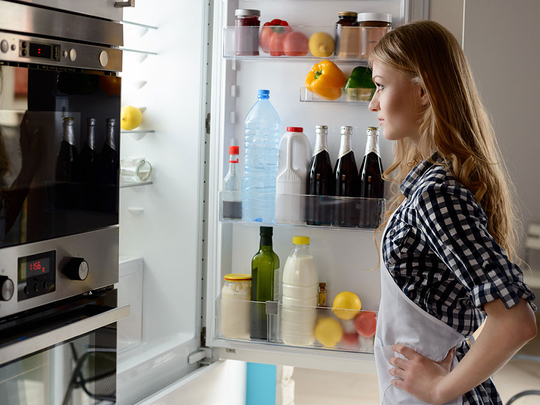
Dubai: Millions of food poisoning cases worldwide are recorded every year and most often, people have no clue what 's making them sick.
Could it be the poorly prepared salad at the canteen, the roasted chicken at your favorite fast food outlet or the leftover from last night’s dinner? Chances are, if findings of a new study were to be believed, the culprit is lurking in your own kitchen.
New research from Confused.com suggests that the refrigerator in your home could be the reason you get sick from time to time, with a significant number of consumers admitting they’re not only cleaning up their fridge regularly, they’re also not mindful of how they store their food.
The price comparison website has polled some respondents from the UK and found that more people have fallen ill from contaminated food (34 per cent) than an injury from a do-it-yourself (DIY) project (22 per cent).
When asked what might be making them ill, nearly one in ten (7 per cent) blamed the food they had kept in the refrigerator for too long, while another seven per cent said it was because they consumed food that had gone stale. About four per cent believed it was the leftover food they did not heat up properly.
But the problem may be down to improper food storage. The respondents admitted that they are throwing in their fridge all manner of food, from common items such as cheese (89 per cent), milk (89 per cent), butter (82 per cent), cooked meat (78 per cent) and raw meat (68 per cent) to riskier items, such as pet food (8 per cent).
What is worrying is that they store cooked meats without cover (9 per cent), throw in half used tins of food and keep items in no particular order (22 per cent). To add to that, many people (23 per cent) are not cleaning their fridge once every three months.
“The fridge is the kind of appliance we don’t spare a second glance for and it would seem [people] are throwing in all manner of food, be it leftovers or fresh, and not really taking care of the actual fridge itself. Who knows what kind of dangers could be lurking behind that white door?” noted Gareth Lane, head of Home Insurance at Confused.com.
“People need to take steps to protect themselves and others from any potential cases of food poisoning. It’s also worrying to see so many people admitting they don’t have a home insurance policy, leaving themselves at risk should the worst happen to their home and its contents.”
The latest available statistics from the World Health Organisation suggest that millions of people worldwide get sick from contaminated food every year, with an estimated 582 million cases of 22 different foodborne illnesses recorded in 2010 alone. In Dubai, there were 550 reported cases of food poisoning in 2013, but authorities believe the actual number could be higher.
A specialist at Burjeel Hospital in Abu Dhabi noted that food poisoning cases in the UAE have been mostly due to consumption of raw or undercooked food. Residents also increase the risk of food poisoning by relying mostly on fast food and takeaways.
"[But] one of the most common reasons for food poisoning is failing to properly store food in the fridge," said Saha Samy Abd El Samie El Baz, specialist, emergency medicine, at Burjeel Hospital Abu Dhabi.
The World Health Organisation has highlighted the global threats posed by unsafe food and the need for coordinated action across the entire food supply chain. Unsafe food can contain harmful bacteria, viruses, parasites or chemical substances and cause more than 200 diseases ranging from diarrhea to cancers.
“A local food safety problem can rapidly become an international emergency. Investigation of an outbreak of foodborne disease is vastly more complicated when a single plate or package of food contains ingredients from multiple countries,” said WHO director general Dr Margaret Chan.
El Baz advised UAE residents to be extra careful when preparing and storing food, to lower the risk of poisoning. "Wash your hands thoroughly with soap and hot water before and after preparing food, as well as after handling each different kind of food," El Baz said.
"Keep raw and cooked food separate at all times. Use separate cutting boards for raw meats and vegetables. Ensure cleaning the fridge every week or two, using a mild solution of bleach and water."
Here are more guidelines from WHO on how to store and prepare food correctly:
1. Do not leave cooked food at room temperature for more than two hours.
2. Always store food in covered containers in the refrigerator or freezer.
3. Do not over-stuff the refrigerator or freezer. Good airflow inside the refrigerator is important for effective cooling and keeping food safe.
4. Keep the refrigerator temperature at or below 5 °C.
5. Separate raw meat, poultry, seafood and eggs from other food in your grocery bags and in your refrigerator.
6. Refrigerate or freeze meat, poultry, eggs, seafood and other perishables within 2 hours of cooking or purchasing and in summers, even sooner.
Defrost the right way
1. Never thaw food at room temperature. Defrost food in the refrigerator, cold water or in the microwave.
2. Cook food immediately after thawing.
3. Keep meat and seafood in the refrigerator while marinating.
















